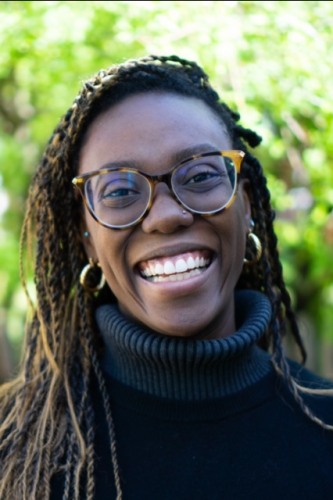
Damali Britton
Biography
Damali Britton is a sixth year Ph.D. candidate in Brown University’s Political Science Department. Her dissertation project, tentatively titled “‘Can You Read?’ Seeing. Reading. Witnessing Anti-black Violence,” draws on various scholarly traditions including contemporary democratic theory, black feminist thought, and phenomenology to examine the place of witnessing in democratic life generally and in black communities specifically. Her project articulates witnessing as a key democratic capacity and brings to the fore the rich traditions of witnessing in black political thought. It engages thinkers such as Frederick Douglass, Ida B. Wells, Judith Butler, and Elizabeth Alexander to theorize the necessity and possibility of witnessing together.
She has received several accolades recognizing her teaching and research including the Northeastern Political Science Association’s Wilson Carey McWilliams Best Graduate Student Paper in Political Theory, the Fulbright U.S. Student Program's Open Research grant, and Brown University’s P. Terrence Hopmann Award for Excellence in Teaching. While pursuing her PhD, Damali has worked on projects for Oxford University’s New Histories of Philosophy Series and Brown University’s Center for Philosophy, Politics, and Economics under the direction of Professor Melvin Rogers as well as attended institutes such as Princeton University’s Feminist Political Theory Summer School and Cornell University’s School of Criticism and Theory. During the 2024-2025 academic year, she was invited to lecture on her research at the University of Alabama and was the instructor of record for “Black Feminist Thought and Action” at Wheaton College.
Job Market Paper Title
A Convergence of Word and Image: Seeing Videos of Antiblack Violence
Job Market Paper Abstract
Darnella Frazier’s recording of a Minneapolis police officer killing George Floyd played an important role in galvanizing record-setting participation in the transnational 2020 Black Lives Matter Protests and the indictment of Floyd’s murderer. Public responses to the recording raise questions about the conditions that enable people to read such videos as evidence of antiblack violence. This paper argues that amid white supremacist narratives that dismiss and justify the violation of black people, circulating these videos is not enough to prompt people to interpret them as depicting racist violence. Intervening in philosophical debates about the connection between seeing and believing, I extend philosopher Judith Butler’s claim that seeing is always enmeshed in a politics of interpretation by theorizing how recent technological advances impact people’s understanding of what they see. I illustrate how Frazier's video enabled subsequent viewers to see the antiblack violence captured. Additionally, I contend that if it is true that narratives can impair how people see, then disrupting harmful ones is eminently important. This paper illuminates how Frazier’s video challenged prevailing narratives that render black drug users disposable and provided an account of Floyd’s story that is now available for reflection and examination for years to come.